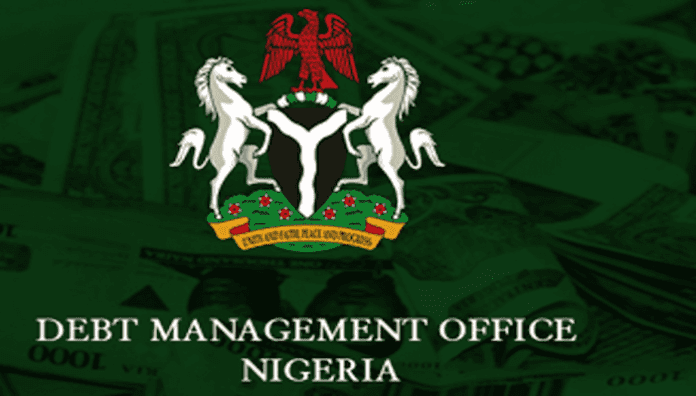Nigeria’s total domestic debt service reached N1.707 trillion in the second quarter of 2025, according to new data published by the Debt Management Office, highlighting the escalating cost of managing the country’s growing debt burden.
The figures reveal that the government spent N1.686 trillion on interest payments across various domestic debt instruments and N20.14 billion on principal repayments during the April to June period. Debt servicing peaked in April at N805.31 billion before declining to N423.10 billion in May and rising slightly to N478.67 billion in June.
The bulk of Nigeria’s domestic debt service was directed toward Federal Government Bonds and Nigerian Treasury Bills, reflecting the government’s continued dependence on domestic borrowing to finance budgetary shortfalls. The DMO reported that Nigeria’s total domestic debt stock had climbed to N76.59 trillion as of mid-2025, with FGN Bonds accounting for N60.65 trillion or 79.18% of the total.
Nigerian Treasury Bills accounted for N537.9 billion in servicing costs for the quarter, with N254.12 billion spent in April, N169.39 billion in May, and N114.39 billion in June. Payments on FGN Bonds were the largest component, totaling N1.074 trillion, comprising N502.66 billion in April, N252.54 billion in May, and N318.84 billion in June.
The FGN Savings Bond, targeted at retail investors, required N3.19 billion in debt service, with consistent monthly payments between N930 million and N1.17 billion. Servicing of FGN Sukuk bonds, which comply with Islamic finance principles, totaled N70.72 billion, driven primarily by a N43.26 billion payment in June and N27.45 billion in April.
Additionally, Nigeria paid N1.08 billion in June to service its Green Bonds, which are linked to environmental sustainability projects. The DMO data also revealed that N20.14 billion was disbursed as principal repayment on naira-denominated promissory notes, while no payments were recorded on foreign currency promissory notes during the period.
The debt service figures come as Nigeria’s total public debt rose to N152.40 trillion as of June 30, 2025, marking a quarterly increase of N3.01 trillion or 2.01% from N149.39 trillion recorded at the end of March. This represents a year-on-year increase of over N30 trillion, underscoring the rapid escalation of Nigeria’s debt profile.
The rising debt burden places significant pressure on government finances. Analysts have expressed concerns about the increase in debt servicing from N8 trillion in 2024 to a projected N16 trillion in 2025, describing it as a red flag for fiscal sustainability. With debt service consuming an increasingly large share of government revenue, less money remains available for critical sectors like education, healthcare, and infrastructure.
Several factors contribute to Nigeria’s growing debt obligations. Foreign exchange volatility has increased the naira value of external debt, while persistent fiscal deficits driven by revenue shortfalls force continued borrowing. Oil revenue volatility, subsidy payments, and the need for infrastructure financing have all contributed to the government’s reliance on both domestic and foreign debt markets.
The domestic debt stock comprises both FGN Bonds and subnational debt. States and the Federal Capital Territory collectively owed N11.32 trillion as of June 2025, with external debt standing at $4.81 billion (N7.36 trillion) and domestic obligations amounting to N3.96 trillion. Subnational debts represent 7.4% of the national total.
The DMO noted that rising exchange rates were a major factor in the increase, particularly affecting the naira value of external debt. Currency devaluation effects have compounded the debt burden, as obligations denominated in foreign currency become more expensive to service when measured in naira terms.
This creates a challenging cycle. As the naira weakens, external debt servicing becomes more expensive in local currency terms, forcing the government to borrow more domestically to meet obligations, which in turn increases domestic debt service costs. The result is an upward spiral in total debt servicing requirements.
The government faces difficult choices ahead. To reduce dependency on borrowing, Nigeria needs to expand non-oil revenues, rein in recurrent expenditure, and improve revenue collection efficiency. However, implementing these reforms while maintaining essential services and addressing infrastructure deficits presents significant political and practical challenges.
Some economists argue that the current debt trajectory is unsustainable if revenue generation doesn’t improve substantially. Others note that while debt levels are rising, they remain manageable if the government can boost economic growth and expand the tax base to generate more revenue relative to debt obligations.
The Q2 2025 debt service figures provide a stark illustration of how much Nigeria’s fiscal space has narrowed. With N1.7 trillion spent on domestic debt service alone in just three months, and external debt service payments adding to the burden, the government has limited resources for development spending unless revenue performance improves dramatically.
Looking ahead, sustaining this level of debt service will require consistent revenue growth, careful debt management, and potentially difficult decisions about prioritizing expenditure. Without structural reforms to boost revenue and control spending, Nigeria risks seeing an ever-larger share of government resources consumed by debt service rather than productive investments in the country’s future.
Source: newsghana.com.gh











